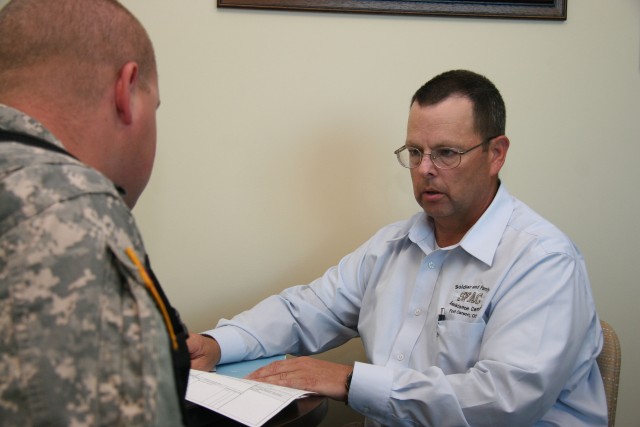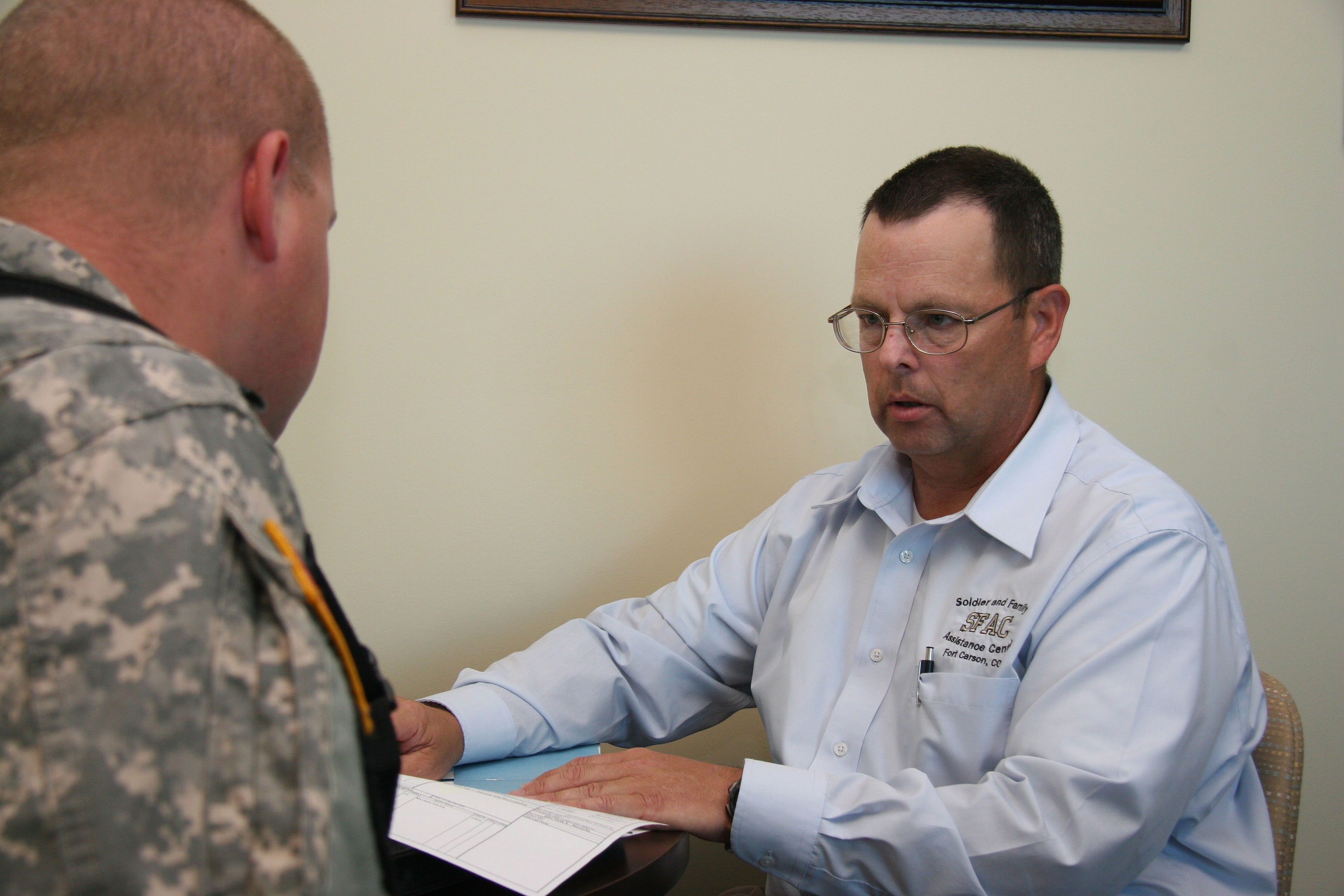FORT CARSON, Colo.-Twenty years of taking care of troops as a personnel Soldier wasn't quite enough for Randy Hart.
The retired Army senior noncommissioned officer now helps wounded warriors learn about their retirement benefits and helps them with out-processing as a human resources assistant at the Soldier and Family Assistance Center.
The SFAC is a one-stop shop to assist wounded warriors and their Families as they either transition back to duty or leave the Army through medical discharge or retirement.
Hart heads the Military Benefits and Defense Eligibility Enrollment Reporting System and Identification Card sections at SFAC.
"A lot of the wounded warriors who come through here don't understand the benefits prior to ... getting out of the Army," he said. "We deal with (post-traumatic stress disorder) and (traumatic brain injury), so it's a repetitive thing that we have to do with them. I just make sure they understand where to go, give them some brochures on time frames that they need to concentrate on. I write everything down for them. I go through my packet that I give them step-by-step."
As a retiree himself, Hart had an idea of the concerns, and even fears, that the Soldiers may be facing, but he said it's different for the Soldiers he works with who are often forced into retirement because of injuries they sustained in battle.
"I was scared to retire, because that was my choice. These guys, it's not their choice; they're being forced. Having the choice that I had, it scared me to death. I didn't have a job; I didn't have anything. I worked through it, of course, everybody does," he said. "I say: 'I know you're scared. I know you're concerned about income coming in. So, let's walk through what you need to have before you get out, just like I did."
Although his focus is on benefits and ID cards, Hart often does much more for the wounded warriors and for other agencies that assist them in their transition, according to Leona Abdullah-Allen, Retirement Services officer.
"He goes out of his way to help us up here in transitions, helping the medical personnel to transition," she said. "If a Soldier is having difficulty, and we need to transition him sooner to get home or anything of that sort, Randy helps us out. Not only does he help us out, he helps out other units as well. It's not his job; he just does it to help the Soldier have a smooth transition to where they need to go."
One would think his personnel job would keep him tied to his desk, but Hart's assistance to wounded warriors often extends outside of his office.
"I had a Soldier come in to me one day and say: 'I'm just having so much trouble getting my (Central Issue Facility clearance) done and getting cleared off the installation. I can't get to these places. I don't understand how to do it,'" Hart said. "I shut down my computer and told the front desk I would be out for a couple of hours. I said: 'Let's go. I'm going to take you around to all of your places and make sure you get them cleared.' I sat with him at every place. He felt more comfortable; he was more relaxed after that. I will do anything and everything for these guys. My life revolves around these guys now. They're always saying that they are going to put a cot in here for me, because I spend a lot of time here. But, I enjoy it. I love working with these Soldiers."
Before he began his job at the SFAC in January 2008, Hart worked for five-and-a-half years at a private insurance company and volunteered at Pikes Peak Hospice, all the while staying up on Army human resources and looking for ways to help Soldiers.
"I came down (to Fort Carson) on a monthly basis and sat in the (Transition Assistance Program) seminars on the employee panels," he said. "That way, I was back with the Soldiers explaining to them, after I retired, this is what I did, maybe just so they could see a different point of view before they got out."
Hart's schedule doesn't give him time for volunteering anymore, but he often stays after hours to assist with events for wounded warriors, he said.
"(Project) Healing Waters comes in and ... they teach them how to tie flies. They take them out on fishing trips all the time. So, we work a little extra just to make sure that they have a place to go to do this," he said. "We have a social at the end of every month for the wounded warrior Families here, the last Tuesday of the month. We stay and just talk to them, greet them and make sure all of their needs are met. I've done ID cards here in the evenings, just in case they couldn't get to me during the day."
Hart said his family supports him, despite the long hours he works.
"The jobs that I applied for before this one, my wife (Carolyn) said: 'OK, all of the other ones weren't meant for you; this one is, because now you're where your heart is with the (wounded warriors),'" he said. "I just wanted to work with the Soldiers. I didn't care what position it was. I didn't care what grade it was.
"My wife always says that I eat, sleep and work all day long with these guys, and it's a constant: 'What can I do next for them' Who didn't I service today' What didn't I do for somebody today'' Everybody that walks through that door is my responsibility. I want to make sure they get the right service. There is no other job that I would rather be doing right now than this one."


Social Sharing